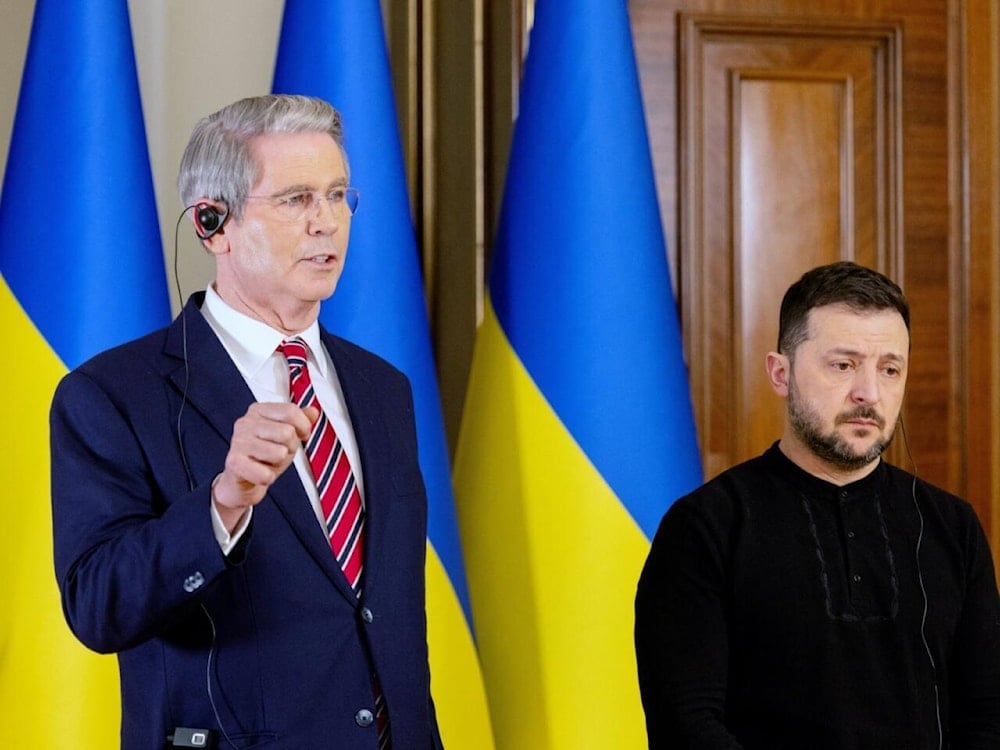US, Ukraine should sign minerals deal ASAP, Bessent says
Amid mounting pressure from Washington, Ukraine resists finalizing a resource extraction deal without firm US security guarantees against Russia.
-

Ukraine's President Volodymyr Zelensky, right, and US Secretary of the Treasury Scott Bessent in Kiev, Ukraine, February 12, 2025 (AFP)
US Treasury Secretary Scott Bessent urged Ukraine's Prime Minister Denys Shmyhal to finalize a key resource extraction deal "as soon as possible" during a meeting in Washington on Wednesday. The agreement would grant the United States royalty payments from profits generated by Ukrainian mining of resources and rare minerals.
Prime Minister Shmyhal visited the United States with the goal of sealing the economic partnership by Saturday. The deal is seen as a form of compensation for US aid provided to Ukraine under former President Joe Biden, following Russia’s military operation in 2022.
According to a brief Treasury readout, Bessent emphasized the need to "conclude technical talks and sign the economic partnership between the United States and Ukraine as soon as possible." He also described the ongoing negotiations as "highly productive".
Ukraine under pressure from Washington over peace terms
The push for the resource extraction deal comes as Ukraine faces increasing pressure from Washington to accept a peace deal with Russia, which includes a ceasefire. The proposed settlement could require Kiev to cede territories currently under Russian control.
Another component under discussion is a separate peacekeeping force to monitor the ceasefire, potentially involving Russians, Ukrainians, and representatives from a neutral, non-NATO country to ensure compliance along the frontlines.
The Ukrainian government fears US President Donald Trump may blame Kiev for stalled peace talks with Russia and halt military aid, The Wall Street Journal reported. President Volodymyr Zelensky affirmed Ukraine's refusal to recognize Crimea as Russian, prompting Trump to warn that such a stance could prolong the conflict for years and risk Ukraine’s sovereignty. Meanwhile, the UK downgraded planned high-level talks on Ukraine to a lower diplomatic tier.
In February, a clash between Trump and Ukrainian President Volodymyr Zelensky stalled progress on the resource extraction deal. Disagreements over territorial concessions and the future of US support have complicated diplomatic efforts.
On Wednesday, Trump stated he believed Russia had agreed to its part of the peace framework. However, just hours later, Moscow launched a missile attack on Kiev early Thursday morning, raising further doubts about the viability of the proposed agreement.
Zelensky resists mineral deal lacking security guarantees
A preliminary economic agreement between Ukraine and the United States aims to secure long-term US involvement in rebuilding Ukraine's war-damaged economy through a co-owned investment fund. The deal involves Ukraine contributing 50% of future revenues from natural resources such as minerals, oil, and natural gas to the joint fund, without transferring ownership of these resources to the US.
The fund's revenues will be reinvested in Ukraine's safety, security, and prosperity. However, specific security guarantees for Ukraine remain undetermined, to be addressed in future negotiations.
Ukrainian President Volodymyr Zelensky declined to accept a proposed agreement granting the United States access to Ukraine’s rare earth minerals, believing it overly favored US interests without offering specific security guarantees. The US proposal, tied to past and future aid, aimed to secure these minerals to reduce dependence on China, but Ukraine insisted such exploitation needed to be linked to security assurances against Russian aggression.
Zelensky intends to provide a counter-proposal emphasizing the necessity for economic ties between Ukraine, the US, and Europe.

 3 Min Read
3 Min Read









